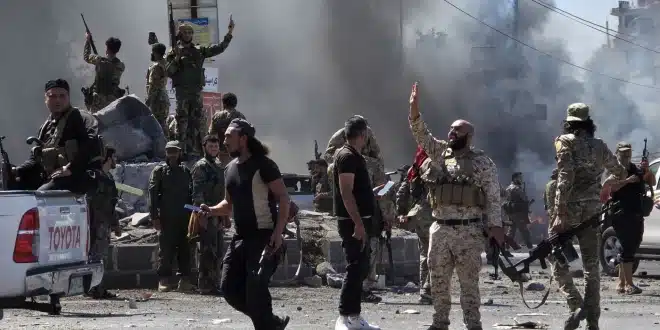Efforts to restore calm in southern Syria showed signs of fragility on Wednesday, as the government and Druze leaders announced a new ceasefire following days of violent clashes. The conflict has highlighted tensions within Syria’s evolving political landscape and sparked direct military action from neighboring Israel.
Syria’s Interior Ministry and Druze religious figures jointly announced a fresh ceasefire agreement aimed at halting days of fighting in the Druze-majority city of Sweida. The announcement came with reports of government convoys beginning to retreat from the area, although doubts remain about the truce’s durability.
A similar ceasefire declared the previous day collapsed within hours, and prominent Druze cleric Sheikh Hikmat Al-Hijri publicly rejected the new arrangement. Despite the latest efforts, Israeli airstrikes on Syrian targets persisted.
Israeli Airstrikes Escalate the Crisis
Tensions escalated sharply when Israel launched rare airstrikes deep into Damascus, targeting the Syrian Defense Ministry near a central square and striking an area close to the presidential palace. Israeli officials described the attacks as a measure to shield the Druze community and push back Islamist elements near their northern border.
Israel’s Defense Minister Israel Katz declared that the “painful blows have begun,” warning that military action would continue unless Syrian government forces retreated. He emphasized that Israel was prepared to escalate its operations, deploying a brigade from Gaza to the Golan Heights in anticipation of potential fallout.
The Background: Local Clashes and Postwar Fragility
The crisis in Sweida originated from tit-for-tat kidnappings and skirmishes between Druze militias and Sunni Bedouin factions. Government troops sent to de-escalate the situation soon found themselves in direct conflict with local Druze forces and were accused of targeting civilians as well.
The clashes threaten the stability of Syria’s postwar transition. Following the ousting of long-time autocrat Bashar Assad in December, Syria’s new Sunni-led administration has struggled to win trust among religious minorities. Sectarian tension, particularly after a wave of retaliatory attacks earlier in the year, remains a key vulnerability.
Syrian Leadership Condemns Israeli Actions
Speaking on national television, interim President Ahmad al-Sharaa appealed to national unity and condemned Israel’s intervention. He reassured the Druze community of their importance to Syria’s social fabric and insisted that efforts to divide the country would not succeed.
“Protecting your rights and freedoms is a top priority,” al-Sharaa said, stressing that Syria would not allow any internal or external actors to destabilize its progress.
He noted that local Druze leaders had been entrusted with maintaining peace in Sweida to prevent a broader national crisis. Al-Sharaa emphasized that Syria’s path forward must prioritize reconciliation and national interest over renewed violence.
Civilian Toll and Rising Humanitarian Concerns
While official figures remain limited, Syria’s Interior Ministry previously reported 30 deaths. However, the UK-based Syrian Observatory for Human Rights placed the toll above 300 by Wednesday morning, including children, women, and over 160 members of Syria’s security forces.
Social media posts have documented disturbing acts on both sides. Government-aligned fighters were seen desecrating Druze symbols and humiliating community leaders, while Druze militias shared footage of captured government troops being beaten. Burned homes and looted neighborhoods have been observed by journalists in the area.
At least 27 people were reportedly executed in the field, and Druze communities in the Israeli-occupied Golan Heights have organized protests against the violence.
Heartbreaking Accounts from the Ground
As the violence raged, families with loved ones in Sweida struggled to make contact. Evelyn Azzam, a 20-year-old woman living near Damascus, fears the worst for her husband, Robert Kiwan, who was trapped in the conflict zone during his daily commute.
Azzam described hearing a gunshot during a phone call with Kiwan as he was interrogated by security forces. She has had no news of his condition since.
In the United Arab Emirates, other Druze women shared similar stories of fear and despair. One recounted how her family hid in their basement as shelling rang out nearby. Another reported that a relative’s home was set ablaze with occupants still inside.
These memories evoke painful echoes of the 2018 Islamic State attack on Sweida, when many Druze civilians took up arms in defense and suffered heavy losses while Assad’s forces failed to intervene.
Israel’s Broader Strategic Position
Israel has maintained a hardline approach to Syria’s new leadership, seeking to keep militant groups far from its borders. It has already taken control of a buffer zone along the Golan Heights, a region it captured in the 1967 war and annexed in 1981. The current strikes mark a significant intensification in Israel’s policy, suggesting that it views the Druze issue and instability in Sweida as immediate threats.
An anonymous Israeli military official confirmed that preparations were underway for “a variety of scenarios” should the conflict escalate further.
International Concerns and U.S. Response
The United States has also expressed alarm over the situation. Secretary of State Marco Rubio called the recent violence a “misunderstanding” and confirmed that Washington was engaging with both Israel and Syria to de-escalate tensions.
With the region already fragile after more than a decade of war, the current crisis presents yet another test of Syria’s unity, Israel’s regional security posture, and the international community’s ability to prevent a return to broader conflict.


